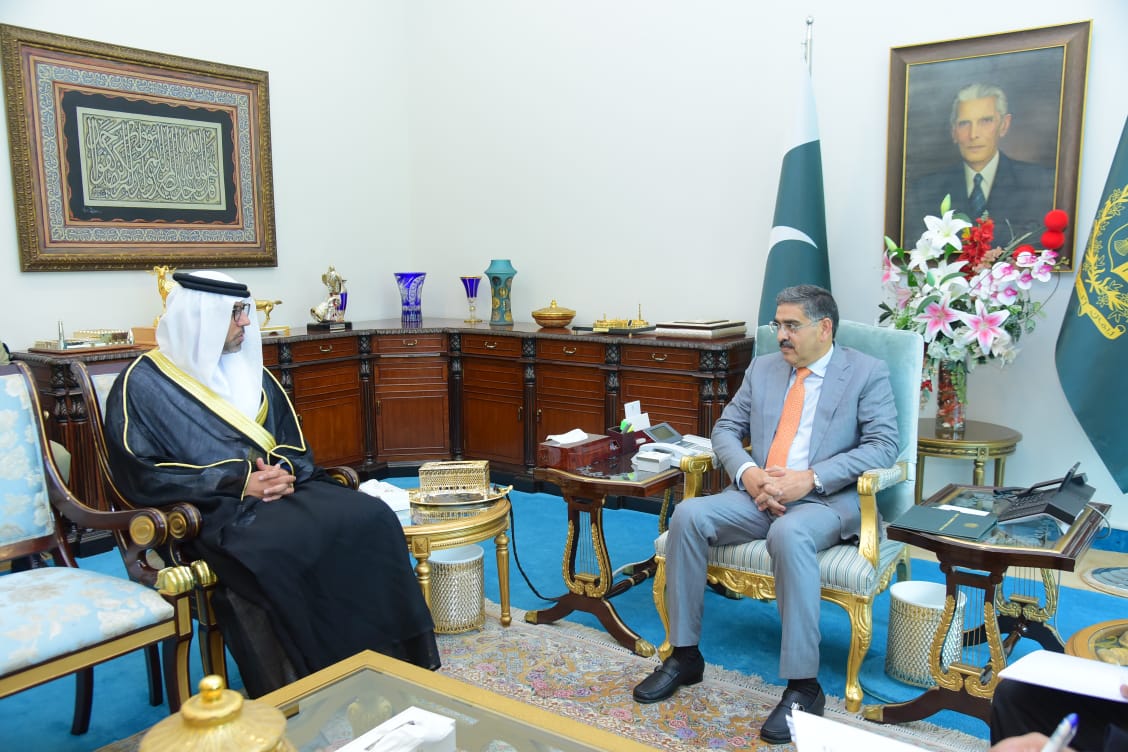ISLAMABAD: The ambassadors of Saudi Arabia and the United Arab Emirates (UAE) to Pakistan called on caretaker Prime Minister Anwaar-ul-Haq Kakar in Islamabad on Wednesday, discussing investments and potential cooperation in the energy, infrastructure, agriculture, IT, and manpower sectors.
Pakistan has deep-rooted ties with both Gulf countries which range from trade, defense production, military, and various other sectors. Saudi Arabia and UAE are also home to more than three million Pakistani expatriates, making them the largest contributors to remittance inflows.
“The Prime Minister emphasized that the recently-instituted Special Investment Facilitation Council (SIFC) would continue to work as before and would lay the foundations to fast-track foreign investments, particularly from Saudi Arabia,” the PM’s Office said about the meeting with the Saudi envoy Nawaf bin Said Al-Malki, Kakar’s first reported sit-down with a foreign dignitary.
“In this regard, he highlighted energy, infrastructure, agriculture, IT, and manpower as potential sectors of cooperation.”
Kakar thanked the Saudi government for its consistent support for Pakistan’s development and progress. “He particularly mentioned the large number of Pakistanis working in Saudi Arabia and requested the Saudi side to continue to extend all possible facilitation to them,” the PMO added.
Later, Kakar also received a call from the ambassador of the UAE, Hamad Obaid Ibrahim Salem Al-Zaabi, who congratulated the new caretaker PM on his appointment on behalf of the UAE government.

UAE ambassador to Pakistan, Hamad Obaid Al-Zaabi, meets caretaker Pakistan Prime Minister Anwaar-ul-Haq Kakar in Islamabad on August 16, 2023. (Photo courtesy: Prime Minister's Office)
“The prime minister said he looked forward to working with the UAE on advancing the two countries’ bilateral cooperation in various fields, especially trade, investment, and energy,” a separate statement issued by the PMO said.
Pakistan set up the Special Investment Facilitation Council (SIFC) in June to attract foreign investment, particularly from Gulf countries. A notification dated June 17 from then Prime Minister Shehbaz Sharif’s Office said SIFC would attract investments in energy, IT, minerals, defense, and agriculture from GCC countries. The body, which has the army chief and other military leaders in key roles, aims to take a “unified approach” to steer the country out of an economic crisis.
Earlier this month, a delegation from Saudi Arabia arrived in Pakistan to explore investment opportunities in the mining sector, aiming to tap into Pakistan’s $6 trillion estimated worth of mineral deposits. The Saudi delegation attended Pakistan’s first dedicated summit on minerals in Islamabad, where then PM Sharif and Pakistan’s army chief Gen Asim Munir spoke in front of a gathering of foreign investors, diplomats, and international dignitaries. The summit was organized under the umbrella of the SIFC.
In July, Pakistan established a Land Information and Management System, Center of Excellence ((LIMS-CoE) to modernize its agricultural sector, with Saudi Arabia providing an initial $500 million investment to set up the facility.
Saudi Arabia and UAE’s continued economic and investment support is key for Pakistan, as economic stabilization is a major challenge for PM Kakar, who took oath this week, with the $350 billion economy on a narrow recovery path after an ongoing $3 billion International Monetary Fund bailout averted a sovereign debt default. Economic reforms have already fueled historic inflation and interest rates.
Pakistan received $2 billion in financial support from Saudi Arabia and $1 billion from the UAE in July before the International Monetary Fund’s board gave the final approval for the bailout deal. The Middle Eastern countries pledged the funds in April but had held off depositing the money with the State Bank of Pakistan until it was sure that the IMF bailout would be forthcoming.












